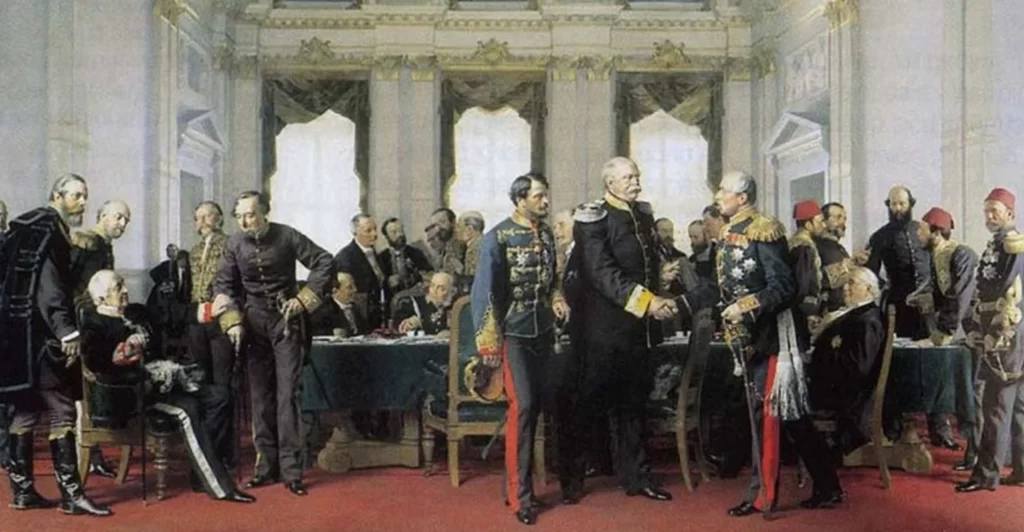
On 1 July 1878, a new chapter began for Cyprus as the island transitioned from Ottoman to British administration. This followed an agreement signed weeks earlier, on 4 June 1878, between the Ottoman Empire and Great Britain during the Congress of Berlin. Known as the Treaty of Defensive Alliance, the deal granted Britain administrative control of Cyprus in exchange for military support to the Ottomans should Russia attack their territories.
Importantly, this transfer was not the result of war or conquest, but a diplomatic agreement designed to serve both empires’ strategic interests. Britain took control of Cyprus for an indefinite period while agreeing to support the Ottomans during the redrawing of Balkan borders after the Russo-Turkish War.
On 1 July, British forces landed on the island and raised the Union Jack, marking the beginning of a new era of political, administrative, and social transformation. In Nicosia, the flag was hoisted by Vice-Admiral Lord John Hay, who formally took control from the Ottoman governor (Mutasarrıf) Beşir Pasha. His mission was short-lived, however, lasting only ten days until the arrival of General Sir Garnet Joseph Wolseley, who would become the first British High Commissioner and de facto governor of Cyprus.

Wolseley arrived in Larnaca on 22 July 1878 aboard the warship Himalaya, accompanied by British and Indian troops. On the same day, he was officially appointed High Commissioner and Commander-in-Chief of the island, replacing the Ottoman governor.
A public proclamation was issued in his name by Chief of Staff Colonel G.R. Greaves. It declared:
“Her Majesty the Queen of Great Britain and Empress of India, in agreement with His Majesty the Sultan, has signed a treaty in Constantinople that grants the occupation and administration of Cyprus in the name and on behalf of Her Majesty.
Under this treaty, Her Majesty has entrusted me, as High Commissioner, with the government of Cyprus. I now assume the administration of the island and declare that the new government aims to promote agriculture and commerce, to establish freedom, justice, and security, and to ensure equality before the law.
The administration will favour no race or religion but will serve the common good. Her Majesty wishes to preserve the traditions and customs of the people and to enforce good governance in harmony with the principles of civilisation and liberty.”
The proclamation concluded with: “God Save the Queen.”

From administration to Crown Colony
Though Cyprus remained nominally under Ottoman sovereignty- Britain paid an annual levy to the Ottoman Empire- the true authority lay with the British. This arrangement remained in place until 1914, when Britain formally annexed Cyprus after the Ottoman Empire joined World War I on the side of Germany.
In 1925, Cyprus was officially declared a Crown Colony of the British Empire, reinforcing the colonial presence and tightening administrative control.
Cyprus and its geopolitical value
The decision to cede Cyprus to Britain was no accident. Strategically located in the Eastern Mediterranean, the island was a critical outpost near Britain’s imperial holdings in India and the Middle East, as well as close to the Suez Canal. For Britain, Cyprus was a key military and political foothold at a time when the major powers were competing for influence in the region.
Birth of the local press
It is also worth noting that the same year the island changed hands (1878), Cyprus saw the birth of its local press. The first printing press began operating that year, and in August 1878, the island’s first newspaper, Cyprus, was published in Larnaca by scholar Theodoulos Konstantinides. The paper, later renamed Kition and then Neo Kition, remained in circulation until 1884.
By 1880, the Alitheia newspaper was being published in Limassol, followed by Ethnos in Larnaca in 1891 and Evagoras and Kypriakos Fylax in Nicosia in 1890 and 1906 respectively. Also in 1906, the newspaper Eleftheria began publication, continuing until 1974. Over time, many other local papers and literary magazines emerged in every major town, marking the growth of Cypriot journalism and public discourse.
Also read: Εάλω η Πόλις- The City has fallen
For more videos and updates, check out our YouTube channel.


